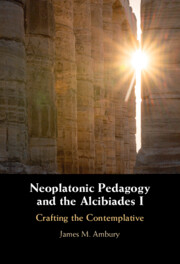338 results
Chapter 4 - Civic Deification in Plato
-
- Book:
- Deification in Classical Greek Philosophy and the Bible
- Print publication:
- 27 June 2024, pp 129-212
-
- Chapter
- Export citation
Introduction
-
- Book:
- Democracy, Theatre and Performance
- Published online:
- 17 May 2024
- Print publication:
- 27 June 2024, pp 1-18
-
- Chapter
- Export citation
Conclusion
-
- Book:
- Deification in Classical Greek Philosophy and the Bible
- Print publication:
- 27 June 2024, pp 305-337
-
- Chapter
- Export citation
Chapter 1 - Rhetoric in Athens
-
- Book:
- Democracy, Theatre and Performance
- Published online:
- 17 May 2024
- Print publication:
- 27 June 2024, pp 19-38
-
- Chapter
- Export citation
1 - Introduction
-
- Book:
- Helping Friends and Harming Enemies
- Print publication:
- 13 June 2024, pp 1-25
-
- Chapter
- Export citation
2 - Helping friends and harming enemies
-
- Book:
- Helping Friends and Harming Enemies
- Print publication:
- 13 June 2024, pp 26-59
-
- Chapter
- Export citation
Chapter 1 - Aristotle’s De anima and the Study of Perishable Living Beings
-
- Book:
- The Architecture of the Science of Living Beings
- Published online:
- 30 May 2024
- Print publication:
- 06 June 2024, pp 15-45
-
- Chapter
-
- You have access
- Open access
- HTML
- Export citation
Chapter 1 - Gorgias of Leontini and Plato’s Gorgias
-
-
- Book:
- Plato's Gorgias
- Published online:
- 25 May 2024
- Print publication:
- 30 May 2024, pp 7-26
-
- Chapter
- Export citation
Chapter 3 - Philosophy and the Just Life in the Gorgias
-
-
- Book:
- Plato's Gorgias
- Published online:
- 25 May 2024
- Print publication:
- 30 May 2024, pp 48-67
-
- Chapter
- Export citation
Introduction
-
- Book:
- Neoplatonic Pedagogy and the Alcibiades I
- Published online:
- 16 May 2024
- Print publication:
- 23 May 2024, pp 1-11
-
- Chapter
- Export citation

Neoplatonic Pedagogy and the Alcibiades I
- Crafting the Contemplative
-
- Published online:
- 16 May 2024
- Print publication:
- 23 May 2024
Chapter 3 - Early Learning in Plato, Republic 7
-
-
- Book:
- Conceptualising Concepts in Greek Philosophy
- Published online:
- 25 April 2024
- Print publication:
- 02 May 2024, pp 56-73
-
- Chapter
- Export citation
Chapter 4 - Are Platonic Forms Concepts?
-
-
- Book:
- Conceptualising Concepts in Greek Philosophy
- Published online:
- 25 April 2024
- Print publication:
- 02 May 2024, pp 74-95
-
- Chapter
- Export citation
Chapter 12 - Relative Concepts
-
-
- Book:
- Conceptualising Concepts in Greek Philosophy
- Published online:
- 25 April 2024
- Print publication:
- 02 May 2024, pp 285-306
-
- Chapter
- Export citation
2 - Ariadne, or the Mediation of the Image
-
-
- Book:
- Nietzsche and Literary Studies
- Published online:
- 03 May 2024
- Print publication:
- 25 April 2024, pp 37-58
-
- Chapter
- Export citation
Chapter 6 - Conclusion
-
- Book:
- Freedom and Power in Classical Athens
- Published online:
- 04 April 2024
- Print publication:
- 11 April 2024, pp 166-174
-
- Chapter
- Export citation
Plato, Socrates, and Confederate Monuments
-
- Article
-
- You have access
- HTML
- Export citation
2 - Ancient Greek and Roman Ethics and Education
- from Part I - Traditions in Ethics and Education
-
-
- Book:
- The Cambridge Handbook of Ethics and Education
- Published online:
- 07 March 2024
- Print publication:
- 14 March 2024, pp 24-42
-
- Chapter
- Export citation
Chapter 5 - Shadows and Caves: The Cinema as Platonic Idea and Reality
- from III - Complex Cinematism
-
- Book:
- Classical Antiquity and the Cinematic Imagination
- Published online:
- 15 February 2024
- Print publication:
- 22 February 2024, pp 156-214
-
- Chapter
- Export citation
Chapter 3 - Daimones between Plato and Pythagoras
-
- Book:
- Reconstructing Empedocles' Thought
- Published online:
- 01 February 2024
- Print publication:
- 08 February 2024, pp 138-184
-
- Chapter
- Export citation



